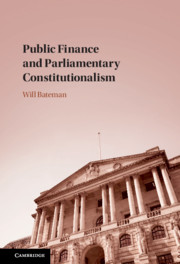Cambridge University Press is
publishing a new book on the history of public finance law in the UK, its
export throughout the British Empire, and its entrenchment in Commonwealth
constitutions.
ABOUT THE BOOK
Public Finance and Parliamentary
Constitutionalism analyses constitutionalism and public finance (tax,
expenditure, audit, sovereign borrowing and monetary finance) in Anglophone
parliamentary systems of government. The book surveys the history of public finance
law in the UK, its export throughout the British Empire, and its entrenchment
in Commonwealth constitutions. It explains how modern constitutionalism was
shaped by the financial impact of warfare, welfare-state programs and the
growth of central banking. It then provides a case study analysis of the impact
of economic conditions on governments' financial behaviour, focusing on the
UK's and Australia's responses to the financial crisis, and the judiciary's
position vis-à-vis the state's financial powers. Throughout, it questions
orthodox accounts of financial constitutionalism (particularly the views of A.
V. Dicey) and the democratic legitimacy of public finance. Currently ignored
aspects of government behaviour are analysed in-depth, particularly the
constitutional role of central banks and sovereign debt markets.
ABOUT THE AUTHOR
Will Bateman, Australian National
University, Canberra
Will Bateman is Senior Lecturer
in Law and the Deputy-Director of Research at the Law School of the Australian
National University, Canberra. He has worked at the apex of constitutional and
financial law, including at the High Court of Australia and Herbert Smith
Freehills.
TABLE OF CONTENTS
1. Finance and constitutionalism
Part I. Historical Development of
Parliamentary Public Finance:
2. History (I): parliament and
executive
3. History (II): judiciary
4. History (III): exporting
parliamentary public finance
5. History (IV): public finance
in the modern state
Part II. Parliamentary Public
Finance in Operation:
6. Fiscal authority
7. Debt and monetary authority
8. Judicial power
Part III. Evaluating
Parliamentary Public Finance:
9. Descriptive failure of
parliamentary control
10. Theory and practice of
financial self-rule.
More info here


No comments:
Post a Comment